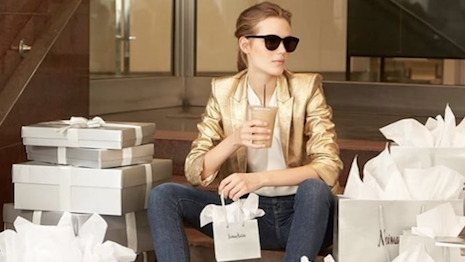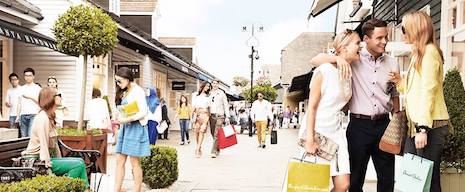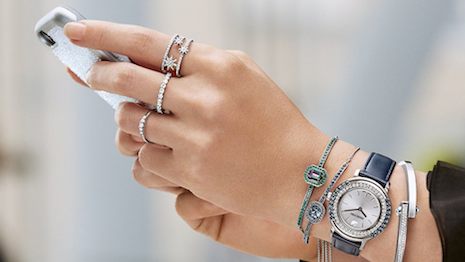 Luxury shoppers are evenly split on whether they will seek out discounts. Image credit: Neiman Marcus
Luxury shoppers are evenly split on whether they will seek out discounts. Image credit: Neiman Marcus
Despite some deep pockets, global luxury shoppers are evenly split in their purchasing habits, with a new YouGov report finding that half only buy luxury items at a discount.
While the discount-oriented luxury shoppers tend to be a bit older, they are demographically very similar to those who will buy luxury at full price. However, many in the discount-oriented group may still be adjusting to their financial situations, since 45 percent have acquired their wealth within the last five years.
"Many in this group may still be adjusting to an affluent lifestyle," said Chandler Mount, vice president of business development at YouGov, New York. "As time goes by, and more people become affluent, they will still be careful with their money and thoughtful with their spending habits.
"In time, they will also grow more comfortable in their financial foundations and feel more at ease in their discretionary spending," he said.
YouGov's new Global Luxury Retail Report examines the 56 percent of global affluents who purchase luxury products and services across several sectors.
Shopping habits
On the surface, luxury shoppers have many demographic similarities. However, their varied experiences give them different perspectives on high-end purchases and spending.
While almost half, 47 percent, of non-discount oriented luxury shoppers come from affluent upbringings, only 28 percent of discount-oriented shoppers had similar backgrounds. When asked what they want more of, value-driven respondents answered "money," and the more established, non-discount shoppers asked for more time in their schedules.
 Only 28 percent of discount-oriented luxury shoppers come from affluent upbringings. Image credit: Bicester Village
"For some, the search for discounts is inherited from their upbringing, and many are maintaining these habits as a way to continue to conserve their money," Mr. Mount said.
U.S. luxury shoppers in particular rely on technology to help them find the best luxury deals.
Forty-nine percent of shoppers take pictures of products, price check online and review exclusive offers when in-store. Nearly a third, 32 percent, also use self-checkout and mobile pay technology.
Only 28 percent of discount-oriented luxury shoppers come from affluent upbringings. Image credit: Bicester Village
"For some, the search for discounts is inherited from their upbringing, and many are maintaining these habits as a way to continue to conserve their money," Mr. Mount said.
U.S. luxury shoppers in particular rely on technology to help them find the best luxury deals.
Forty-nine percent of shoppers take pictures of products, price check online and review exclusive offers when in-store. Nearly a third, 32 percent, also use self-checkout and mobile pay technology.
 Nearly half of all shoppers use mobile devices while in-store. Image credit: Swarovski
Retailers, however, have devoted resources to building store locators, virtual shopping lists and enabling social sharing of products — features that shoppers seldom use. Brands must adapt both their physical and digital hubs to meet the expectations of tech-savvy shoppers (see story).
"The choices that the discount-oriented group make today will have a long-lasting impact in the way it influences retailers in the long run," Mr. Mount said.
Discount decisions
Luxury shoppers in both categories agree that high standards of quality, exceptional design, precision in construction, a high level of service and retention of value are positive indicators of luxury.
Non-discount buyers also favor innovation in luxury brands, but discount-oriented consumers pay closer attention to brand names and prices.
Many luxury retailers may hesitate to offer their merchandise at lower prices, due to worries about diluting their brand reputation. Department stores such as Nordstrom, however, use promotions to drive in-store and online traffic.
"Many big retailers that consistently use discounts are training shoppers to behave a certain way by feeding into continuous promotions," Mr. Mount said.
Discounting may not always factor in purchase decisions, but it is on the rise in the luxury sector, as retailers strive to make up for slowed spending by cutting prices. The annual post-holiday sales last year promised price cuts of up to 80 percent (see story).
Luxury renting, resale, joint ownership and ecommerce also make luxury goods more widely accessible. Although discussion over whether renting or consigning high-end goods counts as luxury may continue, the fashion resale industry has been quietly growing at a massive rate (see story).
"Luxury brands have this opportunity to bring in a new wave of affluent shoppers by showing them the value in owning quality and being able to truly experience the luxury lifestyle," Mr. Mount said.
Nearly half of all shoppers use mobile devices while in-store. Image credit: Swarovski
Retailers, however, have devoted resources to building store locators, virtual shopping lists and enabling social sharing of products — features that shoppers seldom use. Brands must adapt both their physical and digital hubs to meet the expectations of tech-savvy shoppers (see story).
"The choices that the discount-oriented group make today will have a long-lasting impact in the way it influences retailers in the long run," Mr. Mount said.
Discount decisions
Luxury shoppers in both categories agree that high standards of quality, exceptional design, precision in construction, a high level of service and retention of value are positive indicators of luxury.
Non-discount buyers also favor innovation in luxury brands, but discount-oriented consumers pay closer attention to brand names and prices.
Many luxury retailers may hesitate to offer their merchandise at lower prices, due to worries about diluting their brand reputation. Department stores such as Nordstrom, however, use promotions to drive in-store and online traffic.
"Many big retailers that consistently use discounts are training shoppers to behave a certain way by feeding into continuous promotions," Mr. Mount said.
Discounting may not always factor in purchase decisions, but it is on the rise in the luxury sector, as retailers strive to make up for slowed spending by cutting prices. The annual post-holiday sales last year promised price cuts of up to 80 percent (see story).
Luxury renting, resale, joint ownership and ecommerce also make luxury goods more widely accessible. Although discussion over whether renting or consigning high-end goods counts as luxury may continue, the fashion resale industry has been quietly growing at a massive rate (see story).
"Luxury brands have this opportunity to bring in a new wave of affluent shoppers by showing them the value in owning quality and being able to truly experience the luxury lifestyle," Mr. Mount said.
